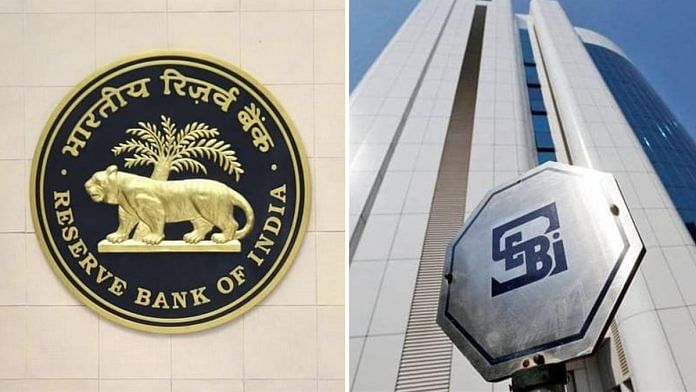New Delhi: JM Financial, a large investment bank in India, and its subsidiaries have over the last few days been at the receiving end of strict actions by the Reserve Bank of India (RBI) and the Securities and Exchange Board of India (SEBI) for a wide range of alleged violations. These violations pertain to lending practices, debt market purchases, and governance issues.
The actions against the investment bank include barring it from providing financing against shares and debentures, and from being the lead manager for any new public issue of debt securities.
The first set of actions was taken by the RBI Tuesday, in which it barred JM Financial Products — a non-banking financial company (NBFC) and subsidiary of JM Financial — from “doing any form of financing against shares and debentures, including sanction and disbursal of loans against Initial Public Offering (IPO) of shares as well as against subscription to debentures”.
Put simply, the NBFC can no longer provide loans to investors who want to buy shares and debentures. These restrictions will remain in place until a special audit is completed by the RBI and the rectification of deficiencies are completed “to the satisfaction of RBI”.
The RBI’s actions were based on a “limited review” conducted by it, in which it found that the company repeatedly helped a group of its own customers bid for various IPOs and debt instruments by using funds loaned by it.
Through a system of Power of Attorney (POA) and a Master Agreement obtained from these customers, the company was able to conduct these transactions without the involvement of the customers at all.
“Consequently, the company was able to effectively act as both lender as well as borrower,” the RBI said in a statement.
“Apart from being in violation of regulatory guidelines, there are serious concerns on governance issues in the company, which in our assessment are detrimental to the interest of the customers,” the RBI further said.
Also Read: India’s banking system faces record liquidity deficit
SEBI gets into the act
Two days later, on 7 March, the SEBI also made public its review of the operations of the parent company JM Financial. This was a much longer and more detailed examination.
It showed that the company used its NBFC and brokerage subsidiaries to lend funds to individual investors, who bought debt securities worth Rs 533 crore on 7 November, 2023, that were issued by the parent company, and sold them back to the NBFC at a premium.
The NBFC then went on to sell these debt securities to corporate buyers in a manner which SEBI noted “does not make commercial sense for a company driven by profit motive”.
“On further examination of the transactions on the day of listing of the said issue, it was observed that JM Financial Products Limited (JMFPL-NBFC), a Non Banking Finance Company (NBFC) and a subsidiary of the Noticee (JM Financial), acted as counterparty to the trades of these individual investors and had also provided the funds deployed by these investors for subscribing to the issue,” the SEBI said in its report.
“JMFPL-NBFC, subsequently, on the very same day, offloaded at a loss a significant portion of the securities that it had acquired from these investors to corporate investors,” the report noted.
It added that the individual investors had applied for the public issue by JM Financial through the stock broker JM Financial Services Ltd (JMFSL-Broker), yet another one of its subsidiaries.
Several other irregularities
Apart from the unusual nature of these transactions, and JM Financial’s “perplexing” explanation for them, SEBI’s investigation found a number of other alleged irregularities.
Among them was that the loans extended by the NBFC subsidiary were disproportionate to the declared incomes of the borrowers.
“It was noted [that] 47 applicants who had declared an annual income of less than Rs 5 lakh were sanctioned loans of Rs 9,80,000 and another 10 investors falling in the same category (less than Rs 5 lakh) were granted loans of Rs 98,00,000,” the SEBI said in its report.
Further, the SEBI found that in certain loan documents, there were references to master loan agreements with future dates, which it said raised concerns about the validity and authenticity of the documentation involved in the loan approval process.
The SEBI also found that several of the borrowers who went on to invest in the debt securities faced a “negative carry” — which is when they would have received a lower return from their investment than the interest they would have to pay on the loan they took.
JM Financial’s defence
Following the RBI’s actions, JM Financial issued a statement in which it defended its loan sanctioning process, the Power of Attorney instrument it used, and the company’s governance.
“After careful and detailed review of the order issued by the RBI on the action against JM Financial Products Ltd, we strongly believe that there have been no material deficiencies in our loan sanctioning process,” JM Financial said in a statement.
“Further, the company has not violated applicable regulations.”
“We also wish to reaffirm that there have been no governance issues whatsoever and we conduct all our business and operational affairs in a bonafide manner,” it added.
The company’s statement further said that, in the context of IPO funding, the Power of Attorney (POA) is taken as a “risk containment measure only”.
“The practice of taking POA is prevalent across the industry and is perfectly legal,” it said, adding that it will “fully cooperate with the RBI in their special audit initiative and explain our position”.
(Edited by Nida Fatima Siddiqui)
Also Read: Credit where credit’s due—Modi govt has scripted an unbelievable banking success story



